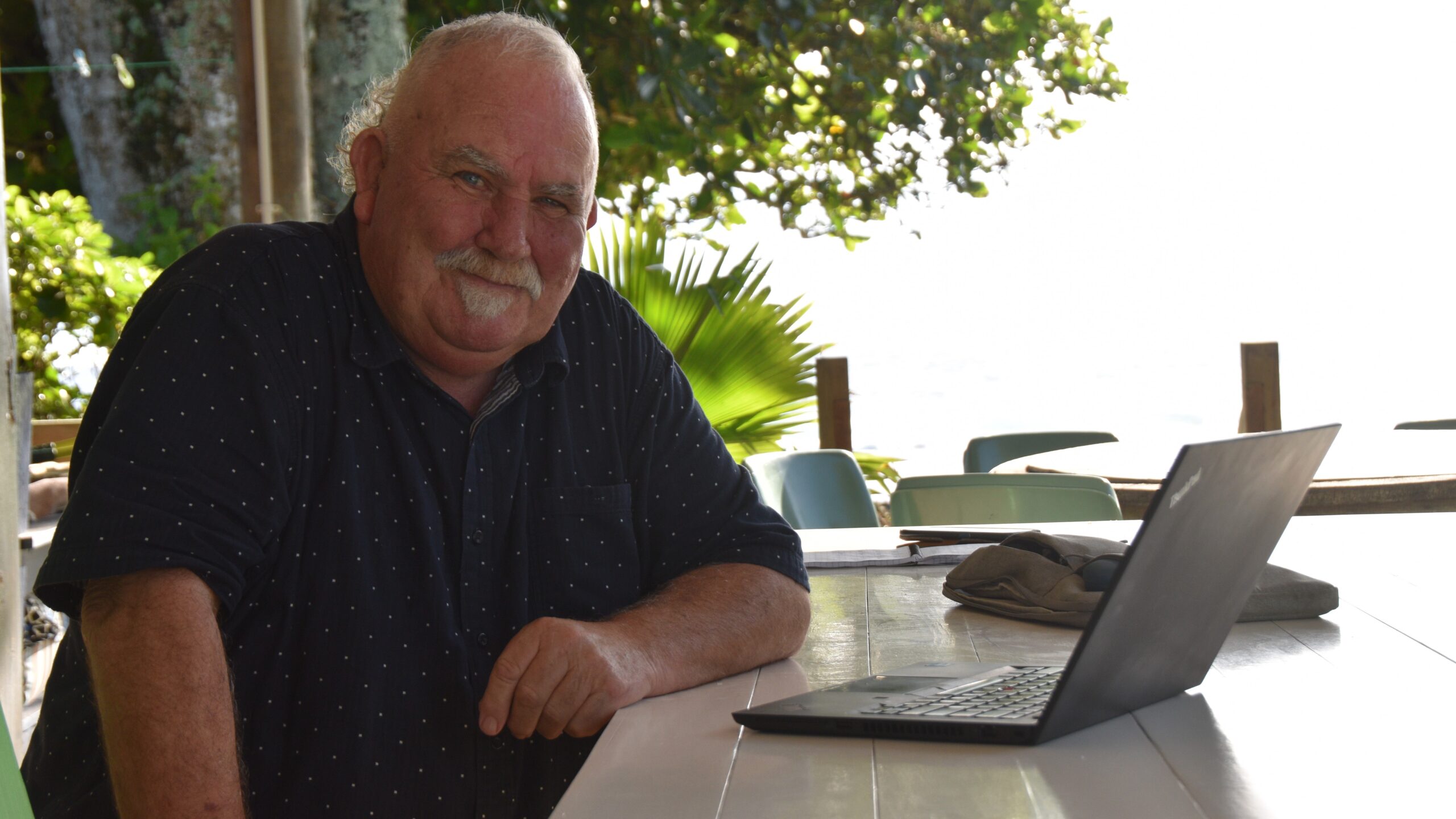‘You have to believe in people’
Saturday 2 July 2022 | Written by Al Williams | Published in Features, Weekend

Black Power life member and social justice activist Denis O’Reilly. Photo: Al Williams/22062833
Black Power life member and social justice activist Denis O’Reilly, 70, has no plans of slowing down.
He is visiting Cook Islands for the first time and doesn’t mince words.
There’s a common thread in his conversation.
Work, mahi, angaanga.
He’s spent a lifetime working for those who struggle.
O’Reilly is in Rarotonga for a birthday party. Another trailblazer, Derek Fox, who alongside O’Reilly, was a voice for marginalised through the tumultuous 1970s, turbulent 80s, and so on. Like Fox, his voice still resonates.
Last month, amid rising gang tensions, and increasing gun crime in New Zealand, he told Newstalk ZB there is some very good work being done by police to mitigate it.
“They are following up on stuff, they can’t go rushing in and end up with bedlam.
“I think it is pretty smart.”
If police were to muscle in, they would end up with “Palestine type warfare”.
“This is smart Kiwi policing.”
“We don’t want to be like the States where you are shooting Black kids on sight.”
O’Reilly says New Zealand Police Commissioner Andrew Coster is probably the smartest commissioner the nation has had since at least the 1970s.
Born in Timaru in 1952, O’Reilly was raised Catholic.
He was among a group of “upwardly mobile Catholics”, and still considers himself one, although with a “small c”.
“I consider myself a Catholic, my mum would say I’m lapsed.”
He says his social awareness came from his parents.
“It was explicit, we had cousins living with us who had tough times.
“There was always a spare seat and a shirt for someone at the table.
“It was an Irish tradition.”
O’Reilly traces his people back to Liverpool in the United Kingdom.
They arrived in Lyttelton, New Zealand in 1857, he says.
He joined the seminary out of school for 12 months, then headed off to Wellington to study law.
“I never got there, I ended up at Collins Motors in Newtown, Wellington.”
That’s where he met Black Power members.
“I would go and drink with them, the cops would pick on them and I was reasonably articulate.
“You had Maori coming into the city, they were gregarious by nature.”
Unemployment was not an issue.
It was in Wellington where O’Reilly met others who were “politically active and socially conscious”.
He joined various organisations including the Tenants Protection Association with the belief in taking “direct action”.
“I’d socialise, I ended up patching up, I ended up as national organiser.”
It was the days of the Norman Kirk government.
“I’ve been arrested a few times,” O’Reilly says.
He then went on to strike up a relationship with former New Zealand Prime Minister Robert Muldoon.
“He sent guys to see us, by that stage we ran a hostel on behalf of the Wellington City Mission where Black Power, Mongrel Mob and Highway 61 members were living.
“We had a work co-operative, there had been full employment and there had been little recessions.”
From there he went to work for Internal Affairs.
He then met his wife and landed a job at the Hawkes Bay Community College.
“That led to a whole lot of experimental things, there was a lot of unemployment by then.”
The work with Internal Affairs continued, which led to employment liaison service postings.
His role in Internal Affairs evolved into communications before he branched out to co-ordinate large scale events.
“I always had pretty good earning ability.”
It was about that time, at the turn of the century, when methamphetamine use became widespread in New Zealand.
“Our guys started to suicide.
“I started a movement against meth and I’ve been on the waka ever since.”
The work continues.
Through the Consultancy Advocacy & Research Trust (CART), O’Reilly, alongside others, work on Māori designed, developed and delivered initiatives to reduce Māori offending and re-offending.
“We don’t talk about meth, we talk about personal development.
“We have come out of the valley of meth.”
He says the young people he works with today are “so advanced compared to us”.
“Whānau Ora (family health) is starting to come through.”
Looking back, he says “You have to believe in people. The power of good is stronger than the power of evil.”
So where to from here for the Black Power, among others?
“What we have to do is don’t go down the suppression path, we have to look at where we’ve been and look at what’s worked.
“The last time New Zealand looked at gangs was in 1987.”
He senses strong leadership here.
“There is knowledge and leadership from Rarotonga whakapapa.”












































